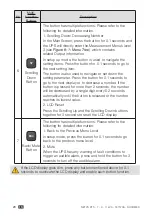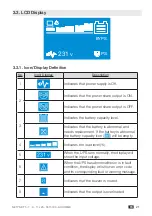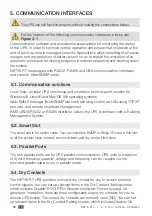
NETYS RT 5 - 7 - 9 - 11 kVA - 551570A - SOCOMEC
11
EN
• Observe the following before replacing the batteries:
- Remove watches, rings, or other metal objects.
- Use tools with insulated handles.
- Wear rubber gloves and boots.
- Do not lay tools or metal parts on the top of batteries.
- Disconnect charging source prior to connecting or disconnecting battery terminals.
- Remove battery grounds during installation and maintenance to reduce
likelihood of shock. Remove the connection from ground if any part of the
battery is determined to be grounded.
•
Do not connect the batteries in reverse; otherwise, a risk of electric shock or fire
accidents might occur.
• The batteries might lose their power during shipment or storage. Before you
use the UPS for the first time, please fully charge the batteries until the battery
capacity percentage shown on the LCD of the UPS is 100% (
). If the UPS
needs to be stored for an extended period of time, please charge the batteries
every three months and ensure that, every time after charging, the battery
capacity percentage shown on the LCD of the UPS is 100% (
).
• The external slits and openings in the battery pack are provided for ventilation. To
ensure reliable operation of the battery pack and to protect the battery pack from
overheating, these slits and openings must not be blocked or covered. Do not
insert any object into the slits and openings that may hinder ventilation.
• Do not allow liquid or any foreign object to enter the battery pack.
• Do not place beverages or any other liquid-containing vessels on or near the battery pack.
The risk of electric shock and short-circuit current is possible when the
batteries are still connected to the UPS even though the UPS is
disconnected from the mains. Do not forget to cut off the battery source
before maintenance.
When the UPS is connected to external battery packs, the installation of
appropriate protective devices, such as a DC fuse or a DC non-fuse
breaker, is required.
Do not dispose of electrical appliances as unsorted municipal waste and
make sure to use separate collection facilities. Contact your local
government for information regarding the collection systems available. If
electrical appliances are disposed of in landfills or dumps, hazardous
substances can leak into the groundwater and get into the food chain, which
can damage health and well-being. When replacing old appliances with new
ones, the retailer is legally obliged to take back your old appliance for
disposal at least for free of charge.












































